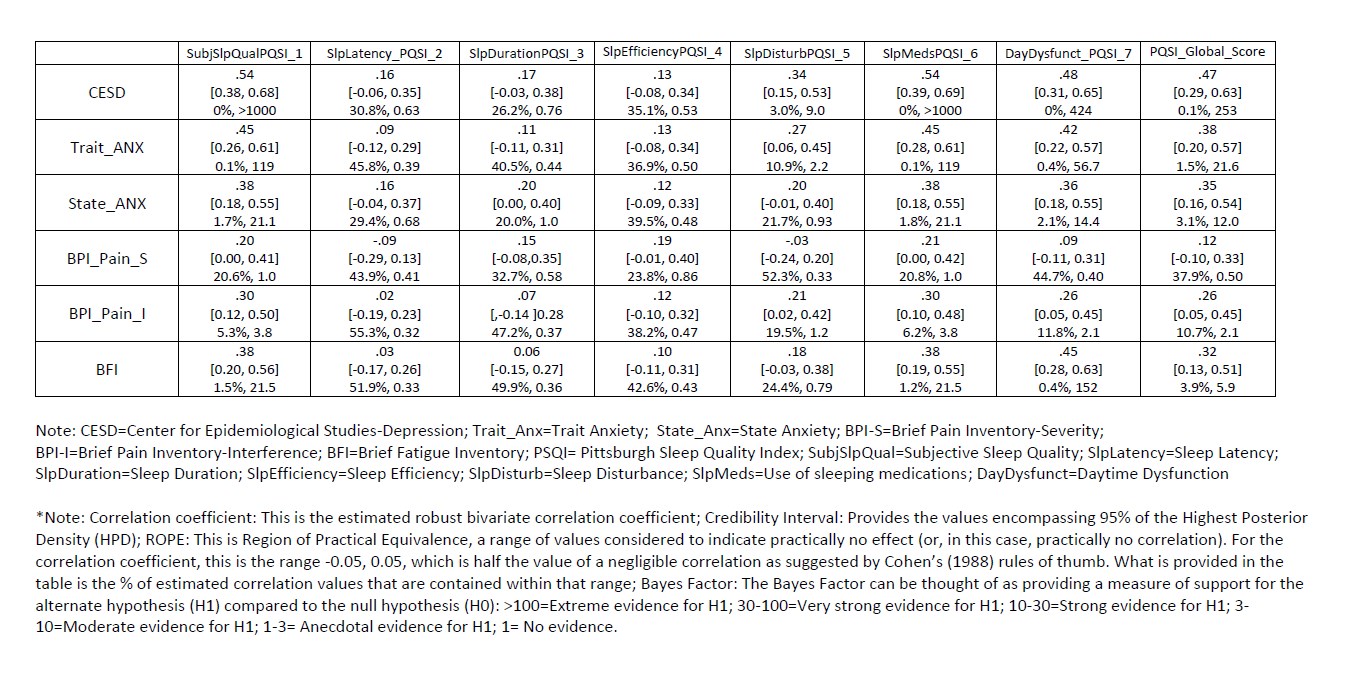Session Information
Date: Saturday, November 6, 2021
Title: Fibromyalgia & Other Clinical Pain Syndromes Poster (0118–0127)
Session Type: Poster Session A
Session Time: 8:30AM-10:30AM
Background/Purpose: There are over 10 million people in the United States suffering with fibromyalgia syndrome (FMS). Individuals with FMS typically report multiple concurrent symptoms including chronic pain, fatigue, distressed mood and sleep disturbances. Evidence demonstrates that 70%-80% of FMS patients suffer from non-restorative sleep; however, dimensions of sleep disturbance in patients with FMS and associations with symptoms are relatively unexamined in this population but necessary to develop personalized strategies to mitigate symptoms and improve functionality and quality of life for this patient population.
Methods: The objective of this analysis was to phenotype dimensions of sleep in a cohort of 50 women at least 18 years old with a confirmed diagnosis of FMS using previously collected data and to examine associations among sleep dimensions and symptoms (pain, fatigue, depression and anxiety). Sleep dimensions were evaluated using the 19-item self-report Pittsburgh Quality Sleep Index (PQSI) that provides information about multiple dimensions of sleep (quality and patterns). Total PQSI scores over 5 indicate severe sleep disturbance. Well-validated measures were used to assess pain, fatigue, depression and anxiety. R version 4.05 was used for statistical analyses. Descriptive statistics report demographic and clinical characteristics. Distributions for robust correlation coefficients among sleep and symptoms were estimated using a Bayesian approach. Bayes factors (BF) were used as measure of strength of evidence for presence of an association.
Results: The mean age of the sample was 48 (SD=11.8). The majority were white (n=26) and non-Hispanic (n=49). Mean global sleep quality was 11.7 (SD=4.7). Mean pain severity reported was 6.0 (SD=1.7) and pain interference was 6.0 (SD=2.3). Severe fatigue was reported by 50% of the participants. At least moderate depressive symptoms were reported by 56% of study participants, and the mean trait and state anxiety were 48.9 (SD=12.8) and 44.1 (SD=13.5) respectively. Forty-eight (48) bivariate correlations were examined: 19 demonstrated at least moderate evidence supporting an association, with coefficients ranging from .30 to .54: 4 had BF 3-10 (moderate), 7 had BF 10-30 (strong), 1 had a BF 30-100 (very strong), and 7 had a BF >100 (extreme evidence). Associations between sleep dimensions and symptoms with a BF > 100 were noted between depression and sleep quality, sleep meds, days dysfunction, and global sleep quality, and between anxiety trait with sleep quality and sleep medications.
Conclusion: This research provides an in-depth examination of multidimensional sleep phenotypes in a cohort of patients with FMS and punctuates associations among multiple sleep dimensions and symptoms of FMS. Given the severity of sleep disturbance reported in this population, strategies to combat this problem are needed to reduce symptom burden in this vulnerable population. This study provides evidence to prompt the development and testing of personalized interventions to mitigate sleep disturbance and improve functionality and quality of life for individuals with FMS.
To cite this abstract in AMA style:
Menzies V, Lynch Kelly D, Weaver M. Multidimensional Phenotypes of Sleep Quality Using the Pittsburg Quality Sleep Index and Associations Among Sleep Dimensions and Symptoms in Women Diagnosed with Fibromyalgia [abstract]. Arthritis Rheumatol. 2021; 73 (suppl 9). https://acrabstracts.org/abstract/multidimensional-phenotypes-of-sleep-quality-using-the-pittsburg-quality-sleep-index-and-associations-among-sleep-dimensions-and-symptoms-in-women-diagnosed-with-fibromyalgia/. Accessed .« Back to ACR Convergence 2021
ACR Meeting Abstracts - https://acrabstracts.org/abstract/multidimensional-phenotypes-of-sleep-quality-using-the-pittsburg-quality-sleep-index-and-associations-among-sleep-dimensions-and-symptoms-in-women-diagnosed-with-fibromyalgia/

